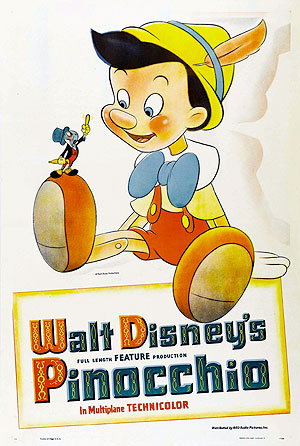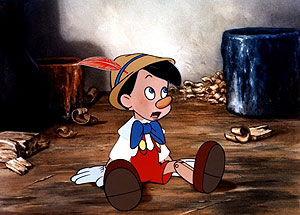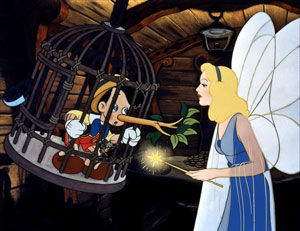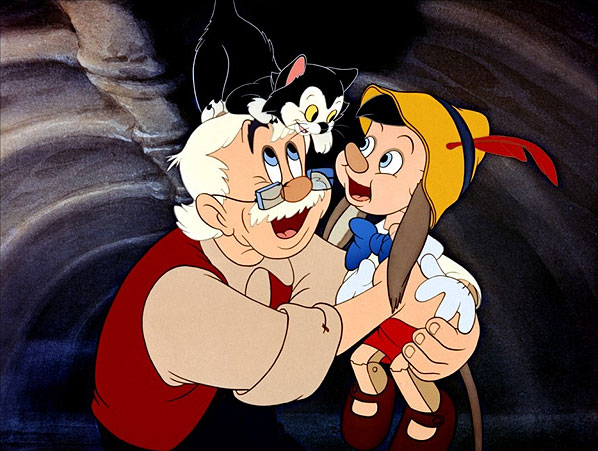
Pinocchio

PINOCCHIO (MOVIE)
RKO Radio Pictures
Original release: February 7th, 1940
Running time: 88 minutes
Producer: Walt Disney
Writer: Carlo Collodi (novel)
Voice cast: Cliff Edwards, Dickie Jones, Christian Rub, Mel Blanc, Walter Catlett

Decisions. Our lives are fraught with them at every corner, but like the characters in so many of the childhood stories we grew up with, it’s how we decide that defines us. Do we act with a pure heart, do we choose justly and do we commit to things for good reasons? Or do we give in to temptation and fear, succumb to greed and abandon the moral code that should govern us all as sentient beings? And what is it that helps us remember this moral code? It’s our conscience of course.
Based on The Adventures Of Pinocchio by Carlo Collodi, Walt Disney’s version of Pinocchio was drastically different from its source material, but at its core its story boils down to how its main character deals with the moral dilemmas he encounters on his journey. Pinocchio, voiced by Dickie Jones, is a wooden puppet carved by elderly toymaker Geppetto (Christian Rub). He’s brought to life one night by the Blue Fairy after making a wish for the puppet to be a real boy and this is witnessed by Jiminy Cricket (Cliff Edwards), a cheerful and wise cricket who acts as Pinocchio’s “conscience”, his guide for the straight and narrow path, and the narrator of the story.
However, Pinocchio’s still very much a puppet, albeit without the strings, but the Blue Fairy tells him if he wants to become a real boy made of flesh and blood he must prove a few things first. He must be brave, truthful and unselfish and able to tell right from wrong by listening to his conscience, which Jiminy describes as “that still small voice that people won’t listen to”. While on his way to school, Pinocchio meets by Honest John the Fox and Gideon the mute Cat who waste no time in leading him astray by telling him he can be an actor instead of going to school like Geppetto told him to.

This provides Pinocchio with the first lesson he must learn as his new friends convince him to join Stromboli’s puppet show where on the first night audiences love his performance of “I’ve Got No Strings”. Wanting to go home and tell Geppetto all about it, he’s instead locked up in a birdcage by the mean and greedy Stromboli who wants to tour with the wooden boy as the show’s star attraction and make lots of money in the process.
When Jiminy arrives to save him he’s unable to free the boy, but the Blue Fairy appears and asks Pinocchio why he disobeyed Geppetto, despite his friend’s urgings. Instead of telling the truth he makes up a whole series of lies to hide his shame, but with each lie his little wooden nose grows longer and longer.  The Blue Fairy explains that a lie will keep growing and growing until it’s as plain as the nose on his face and with this Pinocchio promises never to lie again and she sets him free so he can escape with Jiminy, but it’s not long until he gets himself into trouble again.
The Blue Fairy explains that a lie will keep growing and growing until it’s as plain as the nose on his face and with this Pinocchio promises never to lie again and she sets him free so he can escape with Jiminy, but it’s not long until he gets himself into trouble again.
Seeing another opportunity, Honest John and Gideon sell him to a Coachman who takes stupid little boys to Pleasure Island where they’re stripped of their humanity and are transformed into donkeys. This then enables the Coachman to then sell the boys onto salt mines and circuses and they never see their families again. It’s just the second part of three episodes in the film that sees Pinocchio captured and having to escape, but it’s perhaps the most unsettling episode of all when we think of these poor boys being stripped of their clothes, indulging in vices and being sold into cruelty and slavery for the rest of their lives.
Jiminy scolds Pinocchio for smoking and playing pool and asks him how he expects to become a real boy if he’s doing such things. It’s another bad choice the boy’s made, and unlike Disney’s first feature, Snow White And The Seven Dwarfs (1937), which saw its titular character as a victim of injustice through no wrongdoing of her own, Pinocchio is a film that focuses on a boy’s struggle with his conscience as how he learns how to do the right thing. With its classic animated style, memorable tunes, including the signature theme song “When You Wish Upon A Star” and unforgettable moments, Pinocchio remains one of Disney’s earliest successes and an enduring tale that’s appreciated regardless of age. After all, who among us hasn’t wrestled with our conscience now and then?


Patrick Samuel
The founder of Static Mass Emporium and one of its Editors in Chief is an emerging artist with a philosophy degree, working primarily with pastels and graphite pencils, but he also enjoys experimenting with water colours, acrylics, glass and oil paints.
Being on the autistic spectrum with Asperger’s Syndrome, he is stimulated by bold, contrasting colours, intricate details, multiple textures, and varying shades of light and dark. Patrick's work extends to sound and video, and when not drawing or painting, he can be found working on projects he shares online with his followers.
Patrick returned to drawing and painting after a prolonged break in December 2016 as part of his daily art therapy, and is now making the transition to being a full-time artist. As a spokesperson for autism awareness, he also gives talks and presentations on the benefits of creative therapy.
Static Mass is where he lives his passion for film and writing about it. A fan of film classics, documentaries and science fiction, Patrick prefers films with an impeccable way of storytelling that reflect on the human condition.
© 2022 STATIC MASS EMPORIUM . All Rights Reserved. Powered by METATEMPUS | creative.timeless.personal. | DISCLAIMER, TERMS & CONDITIONS
HOME | ABOUT | CONTACT | TWITTER | GOOGLE+ | FACEBOOK | TUMBLR | YOUTUBE | RSS FEED
CINEMA REVIEWS | BLU-RAY & DVD | THE EMPORIUM | DOCUMENTARIES | WORLD CINEMA | CULT MOVIES | INDIAN CINEMA | EARLY CINEMA
MOVIE CLASSICS | DECONSTRUCTING CINEMA | SOUNDTRACKS | INTERVIEWS | THE DIRECTOR’S CHAIR | JAPANESE CINEMA





